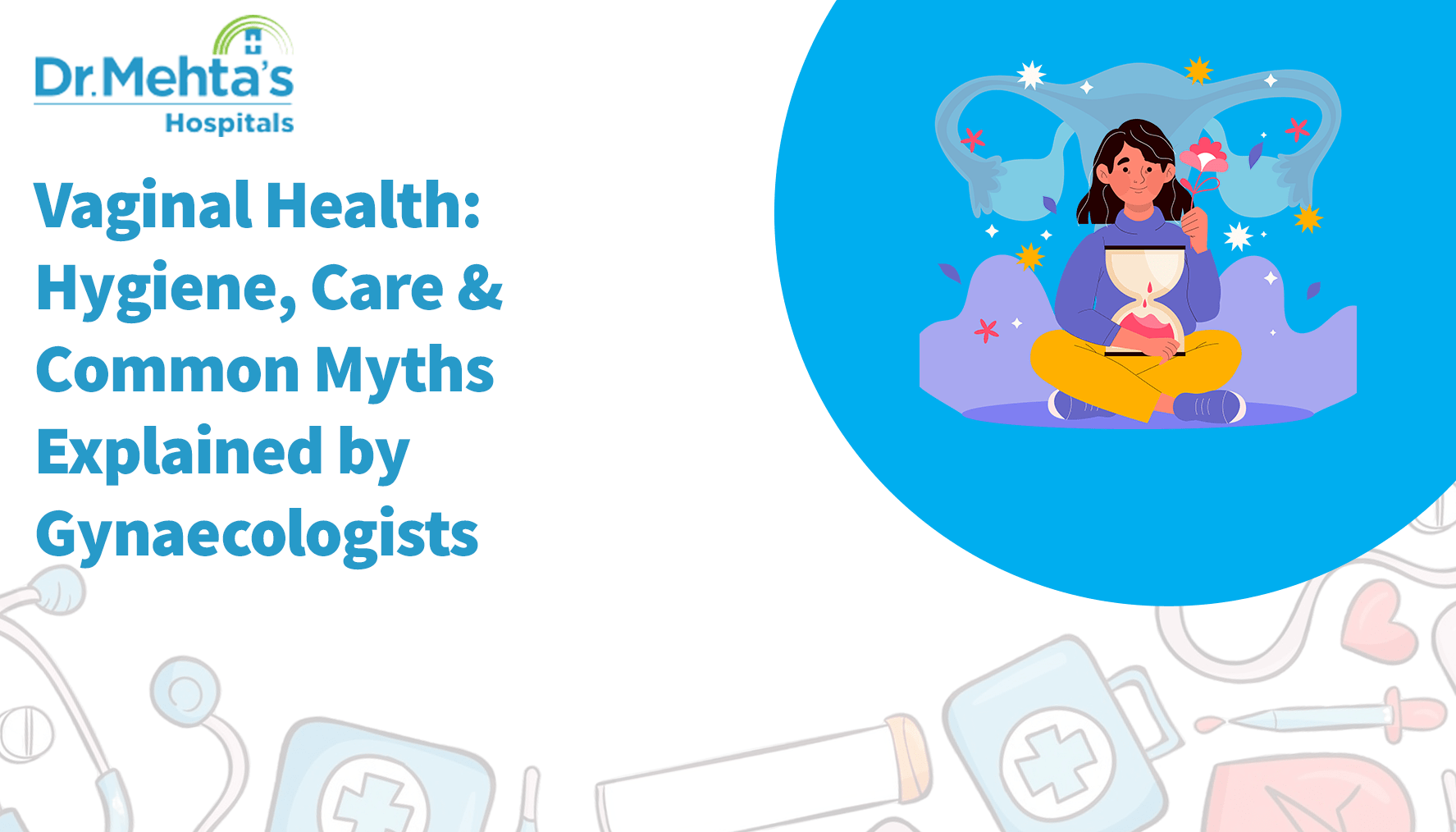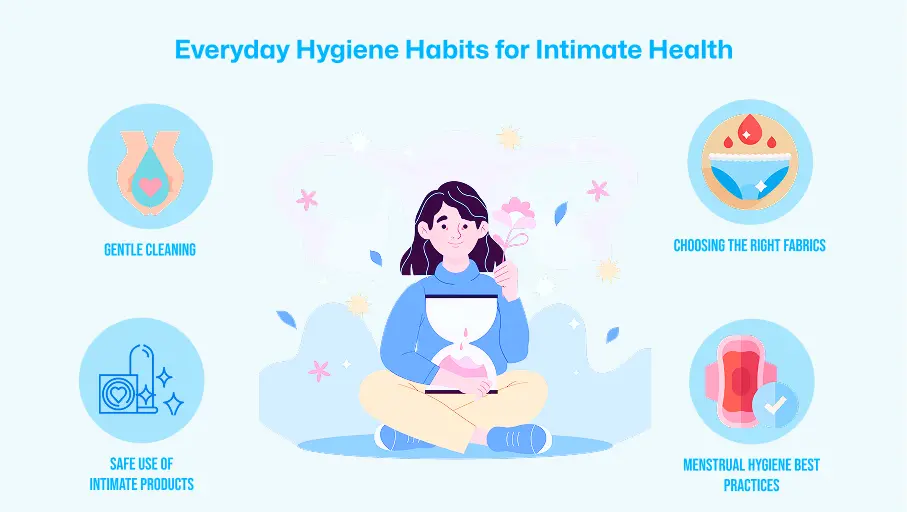Table of Contents

A lot of Indian women are uncertain about how to care for their vagina safely. Although often spoken about with hesitation, it is an important aspect of overall well-being. Vaginal health is no longer just about hygiene, but also comfort, confidence, and the elimination of unnecessary suffering. With the right knowledge, vaginal hygiene can be maintained easily and comfortably.
Vaginal health means keeping the intimate area clean, comfortable, and free from infections. A healthy vagina is self-regulating in its pH and protective bacteria. It can be maintained at all ages with simple daily habits and timely consultation with a gynecologist.
Vaginal health also implies the realization that the vagina cleans itself. The body maintains this balance naturally through regular discharge. When women concentrate on safe hygiene practices such as wearing breathable clothes, non-abrasive washing, and proper menstrual management, they are reinforcing this natural system instead of upsetting it.
The healthy vagina is associated with wellness, comfort during daily living, and self-confidence. It contributes not only to physical health but also to emotional comfort, making women feel safe and taken care of at any age of life, adolescence through pregnancy, and other periods.
Knowing how to maintain vaginal hygiene helps prevent infections, preserve the normal balance, and promote reproductive health in general. During pregnancy, vaginal hygiene is particularly essential for pregnant mothers to prevent unnecessary complications as well as ensure comfort.
Practicing vaginal hygiene helps in the maintenance of the natural protective mechanism of the body, which is set to combat harmful bacteria independently. Common discomforts can be alleviated with simple precautions such as breathable clothing, hydration, and safe menstrual practices. Good hygiene is also a factor that makes women more confident and comfortable in their daily lives.
It is not just about preventing infections, but also about ensuring long-term well-being and comfort. Women who are mindful of hygiene tend to enjoy better overall health, more comfort in daily activities, and peace of mind from taking preventive measures. Gentle care and timely medical advice help women protect their intimate health naturally. For women looking for trusted guidance, consulting a gynecologist in Chetpet can make all the difference in maintaining intimate wellness and peace of mind. If you are unsure about the difference between an obstetrician and a gynaecologist, here’s a quick guide that can help you choose the right specialist for your needs.

The following are some of the small yet effective actions to ensure vaginal hygiene:
Do wash the area with lukewarm water.
This simple approach helps women answer the question of how to have good vaginal hygiene in daily life. For consistent care and expert support, consulting a gynecologist in Velappanchavadi can provide the right guidance for maintaining intimate health and overall comfort.
Breathable cotton underwear is used to keep the area dry and fresh. Avoid wearing very tight clothing for long periods, as it can trap moisture and cause discomfort. Even small changes, like switching from synthetic to cotton fabrics, can make a positive difference.
More than 77.5% of young women in India now use hygienic menstrual products, as noted in a 2019–21 survey. However, many women, especially those in rural and less privileged communities, still face challenges in accessing them.
A lot of people wonder about the hygiene products of the vagina and their needs. The reality: plain water suffices in most cases with women. In case vaginal hygiene products are used, they must be mild, unscented, and prescribed by a doctor. Vaginal lotions or cleansers should only be used if prescribed by a doctor In personal issues, never trust the commercial claims, always get in touch with a consultant from the gynecology department at a Women’s health hospital in Chennai.
In India, more young women aged 15–24 are now using hygienic menstrual methods, rising from about 58% in 2015–16 to over 78% in 2019–21. Still, some groups continue to face gaps in access. Here are some of the best menstrual hygiene practices that you must follow:
Post-delivery care also involves following good menstrual hygiene practices.
Experts suggest the following evidence-based practices:
A gynecologist can guide you with safe options and treatment if needed.
You can also read our women’s care resources to have more topics on women’s health.
Most changes are harmless, but consult a gynecologist if you experience:
During such periods, it is important to have peace of mind with timely gynecology advice.
Managing vaginal health is not a difficult task; this is a matter of balance, awareness, and self-care. Every woman can feel safe and confident with small steps such as gentle washing, wearing breathable clothes, and practicing good menstrual hygiene.
When in doubt, don’t rely on myths or commercial claims—seek expert gynecology advice. At Dr. Mehta’s Hospitals, we have experts who will offer safe and reliable doctor advice in gynecology to women at all ages. Get in touch with our best doctors right now!
FAQs
Table of Contents
Recent Post
About us
Dr. Mehta’s Hospitals is a leading multispecialty hospital in Chennai with over 90 years of excellence. With 400+ beds and 80+ specialties, its Chetpet and Velappanchavadi centers offer advanced, state-of-the-art, compassionate care under one roof.
Chetpet Contact Details
Velappanchavadi Contact Details
Feel free to ask your queries on
Our Specialities
About us
Dr. Mehta’s Hospitals is a leading multispecialty hospital in Chennai with over 90 years of excellence. With 400+ beds and 80+ specialties, its Chetpet and Velappanchavadi centers offer advanced, state-of-the-art, compassionate care under one roof.
Chetpet Contact Details
Velappanchavadi Contact Details
Feel free to ask your queries on
Our Specialities
Quick Links
Center Of Excellence